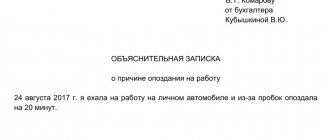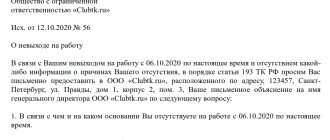An explanatory note is an official document from an employee, written by him personally. It sets out the circumstances of the case or offense committed by the employee.
Based on the explanatory note, the manager makes a decision on the type of disciplinary sanction, so you need to write the note correctly!
Why do you need an explanatory note?
In the document flow, there are a lot of different documents, including an explanatory note. It is used to explain the reasons for certain situations, actions or facts. The paper is considered by law as a form of employee self-defense. And it is on the correctness of its composition and the logic of the presentation of facts that the subsequent decision of the management depends.
Often an explanatory note is required in the following situations:
- various emergency situations affecting production;
- various violations of labor discipline;
- violation of production discipline;
- various disciplinary offenses;
- misconduct.
In particular, most explanatory notes are drawn up due to being late for work or absenteeism, or failure to fulfill official obligations. Here is a sample out-of-office note:
Failure to fulfill duties (tasks) on time
When drawing up a document, you should not shift the blame to another person or group of people if there is someone who is responsible for the production as a whole.
For example, such a test “The plan was not implemented because Ivanov A.A. and Petrov I.E. work slowly" is unacceptable.
The text of the explanatory note about failure to complete a task on time must contain objective reasons:
"General Director of ZhBI-2 LLC"
Gorbunov P.F.
from the master of the sand-lime brick production workshop
Grigolets D.I.
Explanatory letter
Regarding the failure to fulfill the plan for the production of sand-lime bricks for January _____
I, Dmitry Ivanovich Grigolets, can explain the following. Firstly, the plan for January _____ for our workshop was not personally approved by me, about which a corresponding report was written. The volume was set based on last year's figures, which do not correspond to the current situation at the plant - a decrease in the number of deliveries and production in general compared to last year. Secondly, CNC machine No. 2 broke down and has not yet been repaired. A report on this was also filed. Other factors include a decrease in the number of employees. Over the last week, 2 people quit (Ansimov R.K. and Gerasimov S.M.), and CNC operator No. 1 Mishin S.L. has been on sick leave since ___ _________ _____ year. I ask you to analyze the situation again and not punish any of the workers in our workshop for failure to fulfill the plan.
___.___._______ city ________ Grigolets D.I.
Notifying the employee to give an explanation
As already mentioned, the employer is obliged to request a written explanation from its employee before applying a disciplinary sanction (Article 193 of the Labor Code of the Russian Federation). In addition, there is a deadline within which an explanation must be given - two working days. Based on the fact that the legislator allocates a certain time, the employer must document the date when he asked his employee to provide a note. There is no mandatory requirement for this, but from a practical point of view such a document would be useful. Firstly, this is the starting date, and secondly, documentary evidence that the employee’s rights have not been violated. We give an example below to make it clear what should be indicated in it and how to write it. An explanatory note is requested on a letterhead signed by a representative from the employer, whose competence is to impose disciplinary sanctions. Typically, this is the manager or person to whom this authority has been delegated.
Who draws up the document?
An official or report on absenteeism must be drawn up by a person who, by virtue of his position, exercises direct control over the work process and employees:
- Production workshop foreman.
- Senior nurse in a medical institution.
- Senior manager.
- Secretary who keeps time sheets.
- Manager of a store, warehouse.
- Head of department.
- And other similar officials.
Legal significance of explanatory notes
Article No. 193 of the Labor Code (LC) of the Russian Federation obliges the manager, before making a decision on the degree of guilt and punishment of the employee, to receive his written explanations, which must certainly be taken into account in the process of the official investigation.
This is also important to know:
How to restore a work book if lost, independently or through government agencies
The explanatory note is endowed with great legal significance, because it allows:
- objectively and comprehensively assess the situation;
- identify those responsible for the incident;
- take measures to prevent a similar situation in the future;
- exclude further labor disputes based on misrepresentations of facts;
- it is fair to punish (or cancel the punishment) the guilty.
To provide the manager with a legally valuable document, it is necessary to comply with all the rules and regulations when preparing it. From a legal point of view, the note has no evidentiary value and is for informational purposes only.
Who can request an explanatory note
The employer has the right to demand an explanatory statement from the employee under Article 139 of the Labor Code of the Russian Federation. This document must be written. Judicial practice shows that judges often take the employee’s side in a dispute due to the fact that the employer does not formalize the requirement for a written explanation.
The employer has the right to demand an explanatory statement from the employee under Article 139 of the Labor Code of the Russian Federation
If an employee refuses to accept a request from a boss written in the form of a document, a report about this is drawn up. The deadline for writing a note is two days. The legislator gives the employee this period so that he clearly explains in a note the reasons for his actions. For example, what prompted him to violate labor discipline.
At the same time, the Labor Code of the Russian Federation does not contain a mandatory provision for an employee to write an explanation. Perhaps this is due to the following logic of the legislator: if a person values his job and does not want to be fired, then he will definitely, without coercion, write an explanation for his actions.
The employer, on the basis of this document, holds the employee accountable. The employer, for its part, is obliged to realistically assess the current situation, and the employee is obliged to clearly state the circumstances of the case. If the decision made by the employer upon review of the explanatory note does not satisfy the employee, he can turn to the CTS. But labor dispute commissions are created at enterprises - voluntarily, so not all of them are present.
When to write an explanatory note
There are certain deadlines for writing an explanatory note: no more than two working days from the date of the incident. That is why the employer, when drawing up a written request for explanations, must set a date - the report will be kept from this date. If an explanatory note is not written within the prescribed time, the employer has the right to apply to the subordinate any penalties adequate to the offense and within the framework of the law.
It should be remembered that only one disciplinary punishment can be applied for one violation and no later than a month after the fact of the violation is established (the fact is also established in writing, by drawing up and registering a special act).
How to write an explanatory note at work regarding a complaint: sample, template, examples
Explanatory note
A complaint against an employee can be left by clients who are dissatisfied with the level of service or the quality of the services provided. It is more difficult to write an explanatory statement about a complaint than an explanatory statement about any other matter.
The text of the note should reveal the problem, truthfully describe the current situation and justify the employee. On the other hand, explanatory notes of this kind must necessarily contain words of repentance and a promise to prevent such situations in the future.
But what to write if it was the client who initiated the conflict, and the employee does not see his own fault in what happened?
- You should think carefully about your explanation or consult a lawyer.
- There is no need to admit to something that cannot be verified and proven.
- The text may mention the employee’s integrity and diligence, and his lack of disciplinary punishments in the past.
- Draw the employer's attention to any extenuating circumstances.
- Make yourself an explanatory photocopy.
IMPORTANT: If the explanatory note describes objective circumstances that justify the employee in the current situation, he will most likely be able to avoid punishment.
Required details
The explanatory note, like any other document, must indicate a number of details.
This is also important to know:
Characteristics from a place of work for an employee: a sample of how to write a production characteristic
These include:
- name of the organization, structural unit;
- the addressee, often the head of the organization;
- addressee, that is, the direct violator;
- name of the document type;
- registration number. Indicated in the HR department upon registration;
- document text;
- date of writing;
- compiler's signature.
If you take into account all the listed details, after writing you will get a document similar to this:
Types of explanatory
Among the explanatory notes, the following types are distinguished:
- Exculpatory document. They take place when a company employee admits his guilt or unlawful act (expressed in the form of action or inaction). Here there is an indication of what was done by the employee and that he fully admits his wrong points.
- Explanatory notes. They must be drawn up when all the circumstances must be justified on the employee’s side. That is, everything that happened did not depend in any way on the employee, but was caused by external factors. The will of the employee did not in any way affect the final result. In some situations, all of these unlawful acts could have been committed by a third party, which should be mentioned in the explanatory note.
But in general there are a huge number of classifications. Even the smallest things can be reflected in the views. You can even mention the circumstances that make it necessary to write such a document: lateness, absenteeism, illegal actions and other issues. Each of them must be reflected in the explanatory text in order to reveal the full truth of the situation.
What happens if an employee refuses to write an explanatory note?
The subordinate has the right to refuse to provide explanations, and no punishment or DV is provided for this. Management does not have the right to force or force a subordinate to draw up a note. However, such resistance does not relieve the employee from liability for an “unexplained” violation.
In such a case, the manager draws up a report on the employee’s refusal to provide written explanations, signed by two witnesses.
So, requesting an explanatory note is the responsibility of the manager; writing or refusing to write it is the employee’s right. Refusal in no way can be regarded as a disciplinary offense or a violation of the Labor Code.
Free legal consultation We will answer your question in 5 minutes!
Ask a Question
Free legal consultation
We will answer your question in 5 minutes!
Ask a Question
It is possible to refuse to draw up a document, but it is not entirely reasonable. Hiding your “head in the sand” will not solve the problem, and there is a high probability of the situation getting worse.
Proud silence in this case can be regarded as if the employee committed the offense intentionally and intentionally due to his obstinate nature. Explanations with attached evidence of innocence or good reasons will help smooth out the situation and avoid penalties.
If relations are strained to the limit and a conflict has flared up, both parties are advised to secure their position. It is advisable for the employer to draw up a written request for explanations, and for the subordinate to provide them on time; it is advisable to endorse or register the second copy and keep it for yourself.
Video: Disciplinary action in the workplace
You can learn more about disciplinary sanctions, the procedure for appealing them and the use of explanatory notes for this from this video. In addition, you will learn about the deadlines for drawing up notes, consideration of your offense and possible penalties:
An explanatory note is drawn up by an employee in the event of a disciplinary or labor violation and serves to protect the employee from the imposition of penalties or their mitigation. Compiled by the employee at the request of the employer on an A4 sheet by hand or in computer form.
Certificate of refusal
In a situation where an employee categorically refuses to write an explanation, an act is drawn up based on this fact. The correct execution of this document determines the degree of its legal significance.
When drawing up an act, a special form is used, adopted by the enterprise or established by the requirements of GOST.
Certain details are required to be specified:
- Name of the organization.
- Correct title (type and name of the document).
- Date and place of compilation.
- Document registration number.
- Signatures of the head, two members of the commission drawing up the act.
- Approval stamp (only if necessary).
The document must indicate the violation that the employee refused to explain and the reasons for the refusal. An employee who does not want to explain must read the document against signature.
This is also important to know:
Characteristics for a driver from the place of work: sample, features of document preparation
The employee has two working days to provide the note, and only after their expiration can a statement of refusal to provide explanations be drawn up.
An explanatory note is not a death sentence and indisputable evidence of guilt. When writing it, it is worth calling on all possible gifts of persuasion in your rightness or repentance, and most likely the “storm clouds” over the workplace will happily dissipate, which is what we all wish for.
Reasons for writing
When an employee did not comply with his job duties and did not fulfill them fully, then he must have had certain reasons for this. It is these that he must reveal when writing an explanatory note. All the reasons why these “exculpatory” documents are written are related to certain violations. So you should know in what cases an explanatory note is written:
- Late. There may be not only a good reason for this, but also a disrespectful one. The most important thing here is to clearly describe the need for being late or simply admit what you did. In some cases, it will not be superfluous to attach a certificate or, for example, a summons as evidence.
- Fulfillment of functional duties not at the proper level or failure to perform them at all. It could be bad work that doesn't bring any results.
- Not being at the workplace during the working day. If there is no reason for this, then the employee may be held accountable. When everything is documented, there will be no problems.
- Violation of safety rules at the enterprise.
- Negligence during the performance of duties at work, which led to damage to any property of the enterprise.
- Being at the workplace in a state of alcoholic intoxication, or in a state caused by the consumption of narcotic drugs and their components. This leads to violation of labor protection requirements and rules. It is mandatory for the employee to undergo an examination, after which a corresponding report is drawn up.
- Economic violations. This may be a simple failure to inform the management of the enterprise about the work being carried out or poor performance of duties, which only causes damages and losses.
It is worth considering the fact that almost every manager will be satisfied when the employee has attached supporting documents in addition to the explanatory note. Everyone immediately looks at this very well and you can even come to the conclusion that you will avoid punishment.
How to write correctly to avoid punishment
Most of the success when writing an explanatory note depends on its correct composition ; for this you need to follow several rules :
- avoid a large amount of unnecessary information and lengthy narratives; the information should contain useful information that explains the situation;
- do not use eloquent phrases that insult or, conversely, extol the other party who took part in the situation;
- do not hide the truth and do not shift your guilt onto anyone; a sincere confession is more conducive to oneself;
- Avoid grammatical and spelling errors and blots in the explanatory note; it must be written on a clean white sheet of paper, in neat and legible handwriting; the document should not cause irritation just by its appearance.
Explanatory note to school
Such a document may be needed at school due to the child's absence from classes without prior notice or if the parents did not attend the meeting. The document is drawn up by hand, it contains standard data: the addressee of the appeal, date and place of writing, data of the originator, explanations given and signature.
A distinctive feature of this type of explanatory statement is that it is drawn up not by the truant child, but by his parents.
An example of such a document is given here:
Explanatory note to the institute
This type of document is drawn up by the student addressed to the dean of the faculty where he is studying. In addition to standard information, the document must additionally indicate the number of school days missed, indicate the dates and reason for absence. If there is a supporting document (for example, a medical certificate), it must be attached to the explanation.
Explanatory note for work
This type of explanatory note is the most common and is drawn up before management makes a decision on disciplinary action.
This is also important to know:
Characteristics from a place of work for an employee: a sample of how to write a production characteristic
It can be issued as an explanation for one’s absence or failure to fulfill official duties. In the second case, the explanatory note is part of the main document.
In whose name is an employee’s explanatory note at work written?
Every employee can find out in whose name an explanatory note should be written. To do this, just look at the “Internal Labor Regulations”. The managers under whose direct subordination the employee is are clearly indicated there. The explanatory note must be written in the name of one of these people.
If a group of workers is assembled from different departments, then all these people are subordinate to the group leader for the duration of the work task. Consequently, the manager may demand an explanatory note, which will be written in his name.
In whose name is an employee’s explanatory note at work written?
Explanatory note (sample) about an error in work
Now let’s look at a case where it’s much harder to make excuses. Porfiry Zhuchkov forgot to turn off the lights in the office before leaving home. As a result, the light bulb burned out.
The form of this type of document is similar, with the exception of attachments. But on the third point we will give some explanations:
- Zhuchkov must state the essence of his mistake and its reasons.
- It is recommended to mention the consequences as well. This way the manager will see that the employee is assessing the situation soberly.
- The mistake should be admitted and the blame should not be shifted to others. But objective circumstances, if any, can be cited.
- In conclusion, it is good to note that this will not happen again.
Explanatory note to the police
There are situations when explanations have to be written to the police. Such a need may arise in the following cases:
- Calling the squad, who has to give written assurance that there was a response to the call.
- Committing unlawful acts against the applicant, who explains what exactly happened.
- Execution of a document by the offender, which explains where he was and what he was doing at a certain point in time.
The document contains standard information about the recipient of the explanatory note, the originator, the essence of the document, the date of execution and signature. A sample can be viewed here.
Explanatory note to the tax service
Each reporting period, the organization must submit the necessary information to the tax service; this can happen in the following cases:
- failure to submit a tax return to the service on time;
- identifying errors in the declaration when writing words or numbers;
- discrepancies between the data available to the tax office and those submitted by the organization.
The explanatory note is attached to the amended declaration and can be submitted either in person or sent by mail. It needs to answer in detail, but not in a very large volume, the questions that the tax inspector has, for example, why this final figure was obtained, methods for calculating taxes, or for what reason errors were made.
Free legal consultation
We will answer your question in 5 minutes!
Free legal consultation We will answer your question in 5 minutes!
Call: 8 800 511-39-66
Ask a Question
Example:
Explanatory note from the cashier
The work of a cashier is very responsible, as it is carried out in close contact with funds. Therefore, every erroneous action must be accompanied by an explanation and, if possible, evidence attached to it. A note is drawn up in the following cases:
- when a check is bounced for the wrong amount;
- making returns on a receipt tape;
- incorrect calculation, which resulted in a shortage or surplus of funds in the cash register;
- improper maintenance of cash documents.
This is also important to know:
Characteristics for a driver from the place of work: sample, features of document preparation
The main part of the explanatory statement indicates the date of the error, the incorrect amount, the difference in data, check numbers, and the reason for this action. You can also indicate whether it was corrected and in what way. Afterwards, confirmation receipts with the cashier’s signatures, if any, are attached.
Explanatory note in kindergarten
Parents usually write explanations to kindergarten in cases where the child missed several days, but not because of sick leave, or did not visit a doctor, but was treated by the parents themselves.
The note is written not in the name of the teacher, but in the name of the director of the kindergarten. It indicates the child’s name, how many days he missed, what dates they fell on and the reason for the child’s absence.
Example:
Attachments to the note
Often, appendices are attached to the text of the explanatory note. These can be various kinds of certificates (for example, a certificate issued by a paramedic), acts (for example, a report drawn up by the emergency service during the repair of a water or gas pipeline), a relevant article from the media confirming the fact of an accident, damage to a highway, etc. .
The presence of these papers significantly affects the text of the explanatory note, confirming the facts stated in it.
The explanatory note has been drawn up, what next?
The employer, having received the explanatory note, puts on it the registration number of the incoming document and, without fail, the date of reception.
According to Art. 193 of the Labor Code of the Russian Federation, which we referred to at the beginning, the employee has 2 working days to write an explanatory note. If after this time the employee does not provide an explanation, the employer has the right to draw up an appropriate act about this. In order to insure against unlawful actions on the part of the employer, it is better for the employee to register his explanatory note in the office or with the secretary with an appropriate mark on the document, and then pick up a copy of the explanatory note with this mark. Another option: the employee can write an explanatory note in 2 copies, and keep one of them, after marking the acceptance. Then no one will be able to say that the employee did not provide written explanations within the period established by law.
Only his employer (as a rule, represented by the general director) has the right to impose a disciplinary sanction on an employee. He formalizes his decision in the form of a resolution. If the manager decides to punish the offender, then subsequent documents are drawn up on the basis of such a resolution (for example, an order of dismissal, etc.).
An example of an explanatory letter about a mistake due to inattention (official)
"General Director of Stroydepo LLC"
Korolev O.N.
from the driver
Nikitina V.N.
Explanatory letter
Regarding the error in the route
I, Nikitin Vladimir Nikolaevich, ___.___._______, was supposed to follow the Moscow-Mytishchi route with the delivery of goods. Considering that my main route for the last six months included trips only to Krasnogorsk, I mistakenly went to this city. I looked at the route sheet when I arrived in the city to clarify the first address for unloading. I understand the absurdity of the situation and undertake to reimburse the cost of fuel.
___.___._______ city ________ Nikitin V.N.
Sources:
- https://kakzarabativat.ru/pravovaya-podderzhka/kak-napisat-obyasnitelnuyu-zapisku-obrazec/
- https://moyaidea.ru/obyasnitelnaya-zapiska.html
- https://topurist.ru/article/54228-obyasnitelnye-zapiski.html
- https://assistentus.ru/forma/obyasnitelnaya-zapiska/
- https://how2get.ru/job/kak-pravilno-pisat-obyasnitelnuyu-zapisku/
- https://znaybiz.ru/kadry/rezhim/trudovaya-disciplina/kak-napisat-obyasnitelnuyu.html
- https://businessman.ru/new-kak-napisat-obyasnitelnuyu-zapisku.html
- https://yuristland.ru/kak-napisat-obyasnitelnuyu-pravilno-obrazets/
- https://www.delo-press.ru/articles.php?n=16736
Subscribe to the latest news










